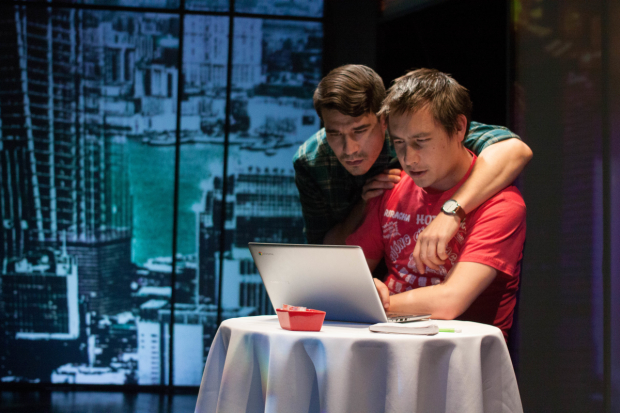Wild Boar
Silk Road Rising presents the English-language premiere of Candace Chong’s Cantonese thriller.

(© Airan Wright)
Hong Kong is a huge metropolis, with urban development that shifts as rapidly as the changing political landscape. But even the technological and architectural growth hasn’t entirely stopped wild boars from encroaching the city limits from time to time. These indigenous animals roam the city for only a short while before being captured and removed by boar-hunting teams. This unexpected bit of wildness — and the efficiency with which it is removed — is the central metaphor of Candace Chong’s Wild Boar, now making its English-language premiere at Silk Road Rising. Adapted by David Henry Hwang, its original 2012 Cantonese production was commissioned by the Hong Kong Arts Festival.
A neo-noir mystery catapulted into the digital age, Wild Boar investigates corruption and collusion in a near-future Hong Kong, where activist professor Mu Ne has disappeared. The media, all owned by corporate conglomerates, refuse to report or investigate the disappearance. Disgusted by the inaction, Mu Ne’s colleague, Ruan (F. Karmann Bajuyo), resigns from his editor position and starts a new, rabble-rousing newspaper, intent on finding his friend and bringing his discoveries to light. Ruan is aided by his troubled wife, Tricia (Christine Bunuan), a photographer; his protégé, Johnny (Scott Shimizu), a fiery womanizer (and Tricia’s sometimes lover); Yam (Fin Coe), a socially stunted hacker; and Karrie (Emily Marso), a sympathetic waitress who provides a meeting space for the nascent newspaper.
All the classic tropes of a film noir are onstage, aided by an intensive design that trades Venetian blinds and cigarette smoke for glass-and-steel skyscrapers and pulsing LED strips. Lindsey Lyddan’s lighting, Yeaji Kim’s sets, Thomas Dixon’s sound design, and Anthony Churchill’s intensive projections are impressively sleek and cinematic but ultimately distracting. With the exception of an enthralling hard-boiled turn by Bajuyo, the performances are often overwhelmed by the technical marvels around them, and the play suffers for it.
While Wild Boar‘s ensemble is talented, at times they appear to be acting in different plays, with mismatched levels of intensity. Director Helen Young makes good use of the shifting set, but the play fails to find the urgent pace required by a thriller. Major discoveries happen offstage, shocking betrayals are telegraphed, and far too much time is devoted to the love triangle that is infinitely less interesting than Ruan’s crusade for truth.
It’s a shame, because Chong’s script addresses a critical issue: In America, like in Hong Kong, corporate influence is growing stronger every day, controlling our news content and shaping our lives in unprecedented ways. As the ties between corporate and government interests strengthen and consolidate, this can only get worse. Though watching the protagonists of Wild Boar square off against this seemingly unstoppable Goliath is enticing, it’s disappointing when the main plot veers off into b-plots and backstories.
It’s easy to see why Silk Road Rising chose to produce Wild Boar now, when it is perhaps even more topical than it was in 2012. In theory, it’s a perfect match. The time is right, the cast is talented, and the production is an impressive technical achievement. But the pieces never quite come together, and the great potential is sadly unfulfilled.








